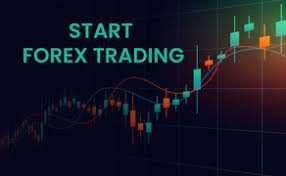
The amount of money needed to start forex trading can vary widely depending on several factors, such as your trading strategy, the broker you choose, and the leverage available.How much money is required to start forex trading in 2024? Generally, you can start with as little as $100 to $500, but here’s a breakdown of the factors to consider:
How much money is required to start forex trading in 2024?
- Broker Requirements: Some brokers offer micro accounts where you can start with a lower minimum deposit, while others might require a higher initial deposit.How much money is required to start forex trading in 2024?
- Leverage: Leverage allows you to control a larger position with a smaller amount of money. For example, with 100:1 leverage, you can control $100,000 with just $1,000 of your own money. However, while leverage can amplify profits, it also increases the risk of significant losses.
- Trading Style: Day trading or scalping might require more capital to manage multiple positions and absorb potential losses, while swing trading might need less capital as positions are held for longer periods.
- Risk Management: It’s crucial to only use money you can afford to lose. Proper risk management is key to long-term success in forex trading.
- Trading Costs: Consider costs like spreads, commissions, and swap fees, which can impact your profitability.How much money is required to start forex trading in 2024?
Starting with a demo account is a great way to get a feel for the market and your trading strategy without risking real money.
1. Broker Requirements
- Micro Accounts: Some brokers allow you to start with as little as $10–$100. These accounts often have smaller trade sizes, making them suitable for beginners.How much money is required to start forex trading in 2024?
- Standard Accounts: Typically require $1,000 or more. These accounts usually offer more trading options and lower spreads.
2. Leverage
- High Leverage: While high leverage (like 500:1) can amplify potential profits, it also significantly increases risk. Small market movements can lead to large gains or losses.How much money is required to start forex trading in 2024?
- Low Leverage: More conservative leverage (like 10:1 or 20:1) requires more capital but can help manage risk better.How much money is required to start forex trading in 2024?
3. Trading Costs
- Spreads: The difference between the bid and ask price. Tight spreads reduce trading costs but can be associated with higher broker requirements.
- Commissions: Some brokers charge a flat fee per trade or a percentage of the trade size.How much money is required to start forex trading in 2024?
- Swap Fees: Interest fees charged for holding positions overnight. These can be positive or negative, depending on the currency pair and position.
4. Risk Management
- Stop-Loss Orders: Help limit potential losses by closing a position at a predetermined price.How much money is required to start forex trading in 2024?
- Position Sizing: Determines how much of your capital is risked on a single trade. Smaller position sizes can reduce risk.
- Diversification: Avoid putting all your capital into a single trade or currency pair.
5. Trading Strategy
- Day Trading: Involves making multiple trades within a single day. Requires more capital and time for monitoring trades.
- Swing Trading: Holds positions for several days to weeks, typically requiring less frequent monitoring and potentially lower capital.
6. Psychological and Practical Considerations
- Emotional Resilience: Trading can be stressful, especially with high leverage and volatile markets. It’s essential to remain calm and disciplined.
- Trading Plan: Have a clear plan with defined goals, risk tolerance, and strategies.
7. Educational Investment
- Learning Costs: Investing in courses, books, or mentors to improve your trading skills can be valuable. While this isn’t a direct requirement, it’s a worthwhile investment in your trading success.How much money is required to start forex trading in 2024?
- Starting small and gradually increasing your trading size as you gain experience and confidence can be a prudent approach. Always ensure that you fully understand the risks and have a well-thought-out plan before committing significant amounts of money.
8. Platform and Tools
- Trading Platforms: Many brokers offer their own trading platforms, such as MetaTrader 4 (MT4), MetaTrader 5 (MT5), or proprietary platforms. Ensure the platform has the features and tools you need.
- Charting Tools: Advanced charting tools and technical analysis indicators can help with making informed trading decisions.How much money is required to start forex trading in 2024?
- Automation: Some traders use automated trading systems or Expert Advisors (EAs) to execute trades based on predefined criteria.
9. Market Analysis
- Fundamental Analysis: This involves analysing economic indicators, news, and geopolitical events to predict market movements. Key factors include interest rates, inflation, and employment data.
- Technical Analysis: Focuses on historical price data and chart patterns to forecast future price movements. Common tools include trendlines, moving averages, and candlestick patterns.How much money is required to start forex trading in 2024?
- Sentiment Analysis: Gauges market sentiment to understand how other traders might react to news or events, often using tools like the Commitment of Traders (COT) report.
10. Risk Management Strategies
- Risk-Reward Ratio: Evaluate trades based on potential reward compared to risk. A common ratio is 2:1, meaning you aim for twice the reward for each unit of risk.How much money is required to start forex trading in 2024?
- Diversification: Spread trades across different currency pairs to avoid overexposure to one market.
11. Regulations and Safety
- Regulation: Choose a broker that is regulated by a reputable financial authority (e.g., FCA, NFA, ASIC). Regulation helps ensure broker reliability and protection for traders.
- Account Security: Look for brokers with strong security measures, including two-factor authentication (2FA) and encryption.
12. Costs Beyond Trading
- Funding and Withdrawal Fees: Some brokers charge fees for depositing or withdrawing funds. Check these fees to avoid unexpected costs.
- Currency Conversion Fees: If your trading account is in a different currency than your bank account, conversion fees may apply.
13. Psychological Factors
- Overtrading: Avoid the temptation to trade excessively, which can lead to significant losses. Stick to your trading plan.
- Greed and Fear: Emotional decisions can impact trading outcomes. Maintaining discipline and sticking to a strategy are crucial.
- Patience: Successful trading often requires patience and the ability to wait for high-probability setups rather than chasing the market.
14. Continuous Learning
- Market Evolution: The forex market is constantly evolving. Stay updated with market trends, new strategies, and changes in regulations.
- Community and Networking: Engaging with other traders through forums or social media can provide insights and support.
15. Paper Trading
- Simulated Trading: Use a demo account or paper trading to practice strategies and build confidence without risking real money.
- Tax Implications: Be aware of the tax regulations related to forex trading in your country. Keep detailed records of all trades and consult a tax professional if needed.How much money is required to start forex trading in 2024?
16. Economic Calendar
- Upcoming Events: Monitor economic calendars for important events like central bank meetings, economic reports, and geopolitical events that can affect currency prices.How much money is required to start forex trading in 2024?
- By considering these additional aspects, you’ll have a more comprehensive understanding of what it takes to start and succeed in forex trading. It’s important to approach trading with a well-rounded strategy and an understanding of both the opportunities and risks involved.
17. Advanced Trading Techniques
- Algorithmic Trading: Uses complex algorithms and mathematical models to execute trades. This can include high-frequency trading (HFT) and quantitative strategies.
- Arbitrage: Exploits price discrepancies between different markets or instruments. For example, currency arbitrage involves buying and selling the same currency pair in different markets to profit from price differences.
- Carry Trading: Involves borrowing funds in a currency with a low interest rate and investing them in a currency with a higher interest rate to earn the difference.
18. Understanding Market Structure
- Market Participants: Learn about the different types of market participants, including retail traders, institutional investors, and central banks. Their actions can influence market movements.How much money is required to start forex trading in 2024?
- Market Hours: The forex market operates 24 hours a day, five days a week. Understanding market sessions (e.g., London, New York, Tokyo) can help in timing your trades.
19. Currency Correlations
- Positive Correlations: Some currency pairs move in the same direction. For example, EUR/USD and GBP/USD often have positive correlations.
- Negative Correlations: Some currency pairs move in opposite directions. For example, USD/JPY and EUR/JPY might show negative correlations.
20. Economic Indicators and News
- Leading Indicators: Provide early signals of economic performance, such as consumer confidence or manufacturing indices.
- Lagging Indicators: Reflect past economic performance, such as GDP or unemployment rates.How much money is required to start forex trading in 2024?
- Coincident Indicators: Reflect the current state of the economy, such as retail sales or industrial production.
21. Understanding Liquidity
- Liquidity: Refers to how easily an asset can be bought or sold without affecting its price. Major currency pairs (like EUR/USD or USD/JPY) are highly liquid, whereas exotic pairs may have lower liquidity and higher spreads.
22. Impact of Global Events
- Geopolitical Events: Events such as elections, wars, and trade agreements can cause significant market volatility.
- Natural Disasters: Events like earthquakes or hurricanes can impact economies and, subsequently, currency markets.
23. Economic and Monetary Policies
- Central Bank Policies: Decisions on interest rates, monetary policy statements, and quantitative easing by central banks (e.g., the Federal Reserve, ECB) can influence currency values.How much money is required to start forex trading in 2024?
- Fiscal Policies: Government spending and taxation policies can also impact economic performance and currency values.
24. Trading Psychology
- Discipline: Stick to your trading plan and avoid impulsive decisions.
- Self-Assessment: Regularly review your trading performance and strategies to identify strengths and areas for improvement.
- Stress Management: Develop techniques to manage stress and maintain focus, such as mindfulness or exercise.
25. Trading Systems and Strategies
- Trend Following: Strategies that aim to capture profits by following the direction of the market trend.
- Counter-Trend Trading: Strategies that involve trading against the prevailing market trend, often used in ranging markets.
- Breakout Trading: This involves entering trades when the price breaks through significant support or resistance levels.
26. Brokerage Selection Criteria
- Reputation: Research the broker’s reputation and history.
- Customer Support: Evaluate the quality and availability of customer support.
- Deposit and Withdrawal Methods: Check the range of options available and associated fees.
27. Diversifying Investment Strategies
- Forex and Stocks: Combining forex trading with stock investments to balance risk and return.How much money is required to start forex trading in 2024?
- Forex and Commodities: Trading commodities (e.g., gold, oil) along with forex to exploit different market conditions.
28. Legal and Compliance Issues
- Know Your Customer (KYC): Brokers may require identification and proof of address as part of regulatory compliance.
- Anti-Money Laundering (AML): Be aware of AML regulations that brokers follow to prevent financial crime.
29. Networking and Learning Resources
- Trading Communities: Join forums, social media groups, and trading communities to share experiences and learn from others.
- Webinars and Workshops: Attend educational webinars and workshops hosted by brokers or trading educators.
30. Long-Term Perspective
- Consistency: Focus on building a consistent trading record rather than seeking quick, large gains.
- Adaptability: Be prepared to adjust your strategies based on changing market conditions and personal experience.
By incorporating these additional considerations into your trading approach, you can build a more comprehensive understanding and improve your chances of success in the forex market. Each aspect plays a role in shaping your overall trading strategy and risk management.

31. Hedging Strategies
- Currency Hedging: Use forex derivatives like options or futures to protect against unfavourable currency movements. This can be useful for businesses or traders with significant exposure to currency risk.
- Portfolio Hedging: Offset potential losses in your trading portfolio by taking positions in correlated or opposite assets.
32. Using Economic Reports
- Understanding Reports: Familiarise yourself with major economic reports and their impact on currencies. For example, Non-Farm Payrolls (NFP) in the US can cause significant volatility in USD pairs.How much money is required to start forex trading in 2024?
- Interpreting Data: Learn how to interpret and analyse the data from economic reports to make informed trading decisions.
33. Risk Management Techniques
- Value at Risk (VaR): Quantify the potential loss in your trading account over a given period with a certain level of confidence. VaR helps in understanding the risk of potential losses.
- Maximum Drawdown: Set limits on the maximum allowable drawdown to avoid significant losses. This helps in maintaining a sustainable trading approach.
34. Trading Psychology and Behavioural Finance
- Behavioural Biases: Be aware of common biases like overconfidence, anchoring, and confirmation bias that can affect trading decisions.
- Emotional Discipline: Develop techniques to manage emotions, such as setting strict rules and avoiding impulsive trading.
35. Advanced Technical Analysis
- Elliott Wave Theory: Analyse market cycles and patterns to predict future price movements based on the wave theory.
- Fibonacci Retracement: Use Fibonacci levels to identify potential support and resistance areas.How much money is required to start forex trading in 2024?
- Ichimoku Cloud: A comprehensive indicator that provides information on support, resistance, trend direction, and momentum.
36. Algorithmic and High-Frequency Trading
- Algorithmic Trading: Develop custom algorithms to execute trades based on specific criteria. This can include trend-following algorithms, mean-reversion strategies, or arbitrage.How much money is required to start forex trading in 2024?
- High-Frequency Trading (HFT): Utilise advanced technology to execute a large number of trades in very short time frames, capitalising on small price movements.
37. Trading Journals and Record-Keeping
- Maintaining a Journal: Keep detailed records of all trades, including entry and exit points, rationale, and outcomes. This helps in analysing performance and improving strategies.
- Performance Metrics: Track key metrics such as win rate, risk-reward ratio, and average profit/loss per trade to evaluate your trading performance.
38. Market Sentiment Analysis
- Sentiment Indicators: Use indicators like the Fear and Greed Index, Commitment of Traders (COT) reports, or social media sentiment to gauge market mood and potential reversals.
- Sentiment Data: Analyse how market sentiment aligns with technical and fundamental analysis to make more informed trading decisions.
39. Scalping Strategies
- Scalping Techniques: Focus on making small, quick trades to capture minor price movements. This often involves high-frequency trading and requires a deep understanding of market microstructure.
- Tools for Scalping: Utilise advanced charting tools and high-speed execution platforms to implement scalping strategies effectively.
40. Fundamental Analysis and Integration
- Interest Rate Differentials: Analyse the impact of interest rate changes on currency pairs, as differences in rates between countries can drive currency movements.How much money is required to start forex trading in 2024?
- Economic Indicators: Combine multiple indicators, such as GDP growth, inflation, and trade balances, to develop a comprehensive view of economic conditions.
41. Legal and Regulatory Considerations
- Regulatory Compliance: Stay informed about regulatory changes in the forex market, including those related to leverage limits, reporting requirements, and trading practices.How much money is required to start forex trading in 2024?
- Legal Issues: Understand the legal implications of trading activities, including taxation and compliance with international trading laws.
42. Customising Trading Strategies
- Backtesting: Test your trading strategies using historical data to evaluate their performance and robustness before applying them in live markets.
- Optimisation: Refine and optimise trading strategies based on backtesting results and real-time performance to enhance effectiveness.
43. Cross-Market Analysis
- Correlations with Other Markets: Analyse how movements in other financial markets (e.g., equities, commodities) can influence currency prices.
- Global Economic Trends: Understand how global economic trends and geopolitical events impact different markets and currency pairs.
44. Advanced Risk Management Tools
- Options for Hedging: Use forex options for hedging purposes to limit risk and manage exposure.How much money is required to start forex trading in 2024?
- Insurance Mechanisms: Explore insurance mechanisms like insurance policies or specific financial products designed to protect against large losses.
45. Trading with News and Events
- Event-Driven Trading: Trade based on scheduled economic releases or unscheduled news events. Develop strategies for anticipating and reacting to major news releases.
- News Trading Risks: Be aware of the potential for increased volatility and slippage around major news events.
46. Social and Copy Trading
- Copy Trading: Use platforms that allow you to copy the trades of experienced traders. This can be a way to leverage the expertise of others while learning from their strategies.
- Social Trading: Engage in social trading networks where traders share insights, strategies, and trade ideas.
47. Currency Pair Dynamics
- Major vs. Minor Pairs: Understand the characteristics of major (e.g., EUR/USD) versus minor (e.g., EUR/GBP) and exotic currency pairs (e.g., USD/TRY) in terms of liquidity, volatility, and spreads.
- Cross-Currency Pairs: Analyse how cross-currency pairs (e.g., EUR/JPY) are influenced by their respective major pairs.
Final
By incorporating these advanced aspects into your forex trading approach, you can further enhance your trading strategy and potentially improve your outcomes in the forex market. How much money is required to start forex trading in 2024? How much money is required to start forex trading?Each of these areas can provide deeper insights and tools for managing your trading activities more effectively.

